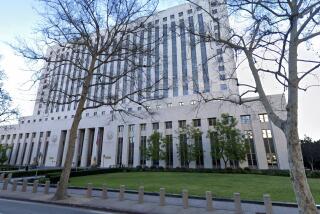Hahn Staff Defends Decision on Bradley
The staff of the city attorney’s office on Wednesday continued to defend its decision not to prosecute Mayor Tom Bradley for alleged conflicts of interest as a City Council ethics panel pushed the lawyers to explain how they reached their conclusions.
“What was missing in this case to prosecute?”asked Councilman Gloria Molina in the third day of hearings. “I don’t know how else to ask it.”
Molina was referring to Bradley’s relationship with Far East National Bank, the focus of much of the ethics committee hearing Wednesday afternoon.
Bradley was paid $18,000 in 1988 as a consultant to the bank, which obtained $3 million in city deposits in 1988 and 1989. Bradley returned the payments.
In a report released last month, City Atty. James K. Hahn said there was “damaging” evidence that Far East benefitted financially from Bradley’s influence, but he said the evidence was not strong enough to prove that Bradley intentionally caused the $3 million to be deposited in the bank.
That evidence was circumstantial, Assistant City Atty. Charles Goldenberg told the ethics panel Wednesday.
The city attorney’s office determined that the circumstantial evidence was too equivocal “for us to have any reasonable chance of successfully prevailing at a trial,” Goldenberg said.
A key piece of circumstantial evidence was a letter sent to Bradley in January, 1988, by Henry Hwang, chairman of Far East. In the letter, Hwang sought Bradley’s help in getting deposits. The letter was forwarded to City Treasurer Leonard Rittenberg and subsequently $1 million in city funds was deposited in Far East.
Further, Bradley telephoned Rittenberg last March 22 and within hours Rittenberg reinstated a $1-million deposit in Far East and added another $1 million.
Goldenberg said Wednesday that there was no direct evidence that the mayor “ordered the treasurer’s office to do their machinations.” He said the transactions might be explained simply by the “craziness” in the treasurer’s office.
In deciding whether to press criminal charges, Goldenberg said, “We make the determination about whether or not there is a likelihood we could win.”
More to Read
Sign up for Essential California
The most important California stories and recommendations in your inbox every morning.
You may occasionally receive promotional content from the Los Angeles Times.






